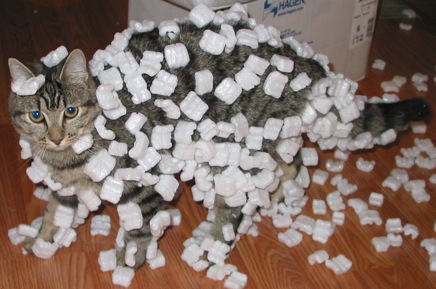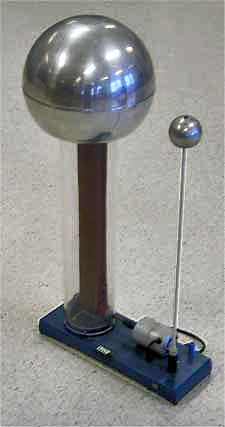|
Wilhelm Holtz
Wilhelm Holtz (15 October 1836 – 27 September 1913) was a German physicist who was a native of Saatel bei Barth, Mecklenburg. Between 1857 and 1862, he studied physics and natural sciences in Berlin, Dijon and Edinburgh. Afterwards, he performed experiments with electricity in Berlin, and later became associated with research at the universities of Halle and Greifswald, where in 1884 he became a professor of physics. In 1865 Holtz invented the "Holtz electrostatic influence machine", an electrostatic induction generator that converted mechanical work into electrostatic energy, needing only an initial charge to begin operation. In the following years, Holtz made modifications, and in the process, manufactured several more of the devices. Electrostatic generators from this era were sometimes referred to as "Toepler-Holtz machines", being named in conjunction with German physicist August Toepler August Joseph Ignaz Toepler (7 September 1836 – 6 March 1912) was a German ... [...More Info...] [...Related Items...] OR: [Wikipedia] [Google] [Baidu] |
Electrostatic Induction
Electrostatic induction, also known as "electrostatic influence" or simply "influence" in Europe and Latin America, is a redistribution of electric charge in an object that is caused by the influence of nearby charges. In the presence of a charged body, an insulated conductor develops a positive charge on one end and a negative charge on the other end. Induction was discovered by British scientist John Canton in 1753 and Swedish professor Johan Carl Wilcke in 1762. Electrostatic generators, such as the Wimshurst machine, the Van de Graaff generator and the electrophorus, use this principle. See also Stephen Gray in this context. Due to induction, the electrostatic potential (voltage) is constant at any point throughout a conductor. Electrostatic induction is also responsible for the attraction of light nonconductive objects, such as balloons, paper or styrofoam scraps, to static electric charges. Electrostatic induction laws apply in dynamic situations as far as the quas ... [...More Info...] [...Related Items...] OR: [Wikipedia] [Google] [Baidu] |
1836 Births
Events January–March * January 1 – Queen Maria II of Portugal marries Prince Ferdinand Augustus Francis Anthony of Saxe-Coburg-Gotha. * January 5 – Davy Crockett arrives in Texas. * January 12 ** , with Charles Darwin on board, reaches Sydney. ** Will County, Illinois, is formed. * February 8 – London and Greenwich Railway opens its first section, the first railway in London, England. * February 16 – A fire at the Lahaman Theatre in Saint Petersburg kills 126 people."Fires, Great", in ''The Insurance Cyclopeadia: Being an Historical Treasury of Events and Circumstances Connected with the Origin and Progress of Insurance'', Cornelius Walford, ed. (C. and E. Layton, 1876) p76 * February 23 – Texas Revolution: The Battle of the Alamo begins, with an American settler army surrounded by the Mexican Army, under Santa Anna. * February 25 – Samuel Colt receives a United States patent for the Colt revolver, the first revolving barrel multishot firearm. ... [...More Info...] [...Related Items...] OR: [Wikipedia] [Google] [Baidu] |
University Of Greifswald Faculty
A university () is an institution of higher (or tertiary) education and research which awards academic degrees in several academic disciplines. ''University'' is derived from the Latin phrase ''universitas magistrorum et scholarium'', which roughly means "community of teachers and scholars". Universities typically offer both undergraduate and postgraduate programs. The first universities in Europe were established by Catholic Church monks. The University of Bologna (), Italy, which was founded in 1088, is the first university in the sense of: *being a high degree-awarding institute. *using the word ''universitas'' (which was coined at its foundation). *having independence from the ecclesiastic schools and issuing secular as well as non-secular degrees (with teaching conducted by both clergy and non-clergy): grammar, rhetoric, logic, theology, canon law, notarial law.Hunt Janin: "The university in medieval life, 1179–1499", McFarland, 2008, , p. 55f.de Ridder-Symoens, Hilde' ... [...More Info...] [...Related Items...] OR: [Wikipedia] [Google] [Baidu] |
19th-century German Inventors
The 19th (nineteenth) century began on 1 January 1801 ( MDCCCI), and ended on 31 December 1900 ( MCM). The 19th century was the ninth century of the 2nd millennium. The 19th century was characterized by vast social upheaval. Slavery was abolished in much of Europe and the Americas. The First Industrial Revolution, though it began in the late 18th century, expanding beyond its British homeland for the first time during this century, particularly remaking the economies and societies of the Low Countries, the Rhineland, Northern Italy, and the Northeastern United States. A few decades later, the Second Industrial Revolution led to ever more massive urbanization and much higher levels of productivity, profit, and prosperity, a pattern that continued into the 20th century. The Islamic gunpowder empires fell into decline and European imperialism brought much of South Asia, Southeast Asia, and almost all of Africa under colonial rule. It was also marked by the collapse of the la ... [...More Info...] [...Related Items...] OR: [Wikipedia] [Google] [Baidu] |
Tägliches Cincinnatier Volksblatt
''Tägliches Cincinnatier Volksblatt'' was a German-language newspaper which was founded in 1836 and was printed in Cincinnati, Ohio. The paper served the German population of Cincinnati until it published its last issue on December 5, 1919. The newspaper lost support during the WWI period and lost the support of brewing advertisers due to Prohibition Prohibition is the act or practice of forbidding something by law; more particularly the term refers to the banning of the manufacture, storage (whether in barrels or in bottles), transportation, sale, possession, and consumption of alcoholic .... The paper was absorbed by the other Cincinnati German language paper the '' Freie Presse''. References Defunct newspapers published in Cincinnati German-language newspapers published in Ohio 1836 establishments in Ohio 1919 disestablishments in Ohio {{Ohio-newspaper-stub ... [...More Info...] [...Related Items...] OR: [Wikipedia] [Google] [Baidu] |
August Toepler
August Joseph Ignaz Toepler (7 September 1836 – 6 March 1912) was a German chemist and physicist known for his experiments in electrostatics. Biography August Toepler was born on 7 September 1836. He studied chemistry at the Gewerbe-Institut Berlin (1855–1858) and graduated from the University of Jena in 1860. Later Toepler turned to experimental physics. August Toepler was a lecturer of chemistry and physics at the Academy Poppelsdorf (1859-1864). He received a chair of chemistry and chemical technology at the Polytechnic Institute of Riga and he hold this position between 1864 and 1868. In 1864, he applied Foucault's knife-edge test for telescope mirrors to the analysis of fluid flow and the shock wave. He named this new method schlieren photography, for which he is justifiably famous. He also developed the Toepler machine, an electrostatic influence machine (high voltage generator) in 1865, which would one day find use in early medical x-ray machines. Improved v ... [...More Info...] [...Related Items...] OR: [Wikipedia] [Google] [Baidu] |
Holtz Influence Machine
Holtz is the surname of: * Alexander Holtz (born 2002), Swedish ice hockey player * Andrew Holtz, American journalist * Carl Holtz (1920–2006), American oarsman and farmer * Daniel Holtz, a fictional character on the TV series ''Angel'' * Eric Holtz (born 1965), American Head Coach of the Israel National Baseball Team * Jürgen Holtz (1932–2020), German actor on stage and in film, artist and author * Hyman Holtz (1896–c. 1939), American mobster * Itshak Holtz (born 1925), Painter * Kaila Holtz (born 1981), a 2004 Canadian Olympic softball pitcher * Lou Holtz (1893–1980), American comedian * Lou L. Holtz (born 1937), a retired national championship winning college football coach * Mark Holtz (1945–1997), former broadcaster for the Texas Rangers * Mike Holtz (born 1972), American baseball player * Pat Holtz, Scottish pool player * Sabine Holtz (born 1959), German historian * Skip Holtz (born 1964), head football coach of University of South Florida * Stefan Holtz (born 1 ... [...More Info...] [...Related Items...] OR: [Wikipedia] [Google] [Baidu] |
Electrostatic
Electrostatics is a branch of physics that studies electric charges at rest (static electricity). Since classical times, it has been known that some materials, such as amber, attract lightweight particles after rubbing. The Greek word for amber, (), was thus the source of the word 'electricity'. Electrostatic phenomena arise from the forces that electric charges exert on each other. Such forces are described by Coulomb's law. Even though electrostatically induced forces seem to be rather weak, some electrostatic forces are relatively large. The force between an electron and a proton, which together make up a hydrogen atom, is about 36 orders of magnitude stronger than the gravitational force acting between them. There are many examples of electrostatic phenomena, from those as simple as the attraction of plastic wrap to one's hand after it is removed from a package, to the apparently spontaneous explosion of grain silos, the damage of electronic components during manufa ... [...More Info...] [...Related Items...] OR: [Wikipedia] [Google] [Baidu] |
Electrostatic Generator
An electrostatic generator, or electrostatic machine, is an electrical generator that produces ''static electricity'', or electricity at high voltage and low continuous current. The knowledge of static electricity dates back to the earliest civilizations, but for millennia it remained merely an interesting and mystifying phenomenon, without a theory to explain its behavior and often confused with magnetism. By the end of the 17th century, researchers had developed practical means of generating electricity by friction, but the development of electrostatic machines did not begin in earnest until the 18th century, when they became fundamental instruments in the studies about the new science of electricity. Electrostatic generators operate by using manual (or other) power to transform mechanical work into electric energy, or using electric currents. Manual electrostatic generators develop electrostatic charges of opposite signs rendered to two conductors, using only electric for ... [...More Info...] [...Related Items...] OR: [Wikipedia] [Google] [Baidu] |
Physicist
A physicist is a scientist who specializes in the field of physics, which encompasses the interactions of matter and energy at all length and time scales in the physical universe. Physicists generally are interested in the root or ultimate causes of phenomena, and usually frame their understanding in mathematical terms. Physicists work across a wide range of research fields, spanning all length scales: from sub-atomic and particle physics, through biological physics, to cosmological length scales encompassing the universe as a whole. The field generally includes two types of physicists: experimental physicists who specialize in the observation of natural phenomena and the development and analysis of experiments, and theoretical physicists who specialize in mathematical modeling of physical systems to rationalize, explain and predict natural phenomena. Physicists can apply their knowledge towards solving practical problems or to developing new technologies (also known as ... [...More Info...] [...Related Items...] OR: [Wikipedia] [Google] [Baidu] |




